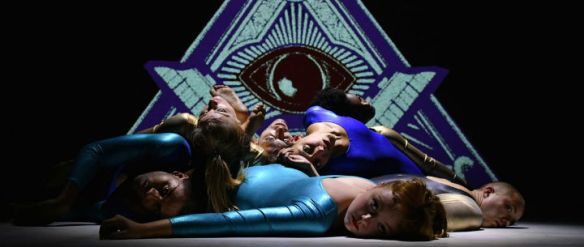More than 200 years after the Illuminati was founded to oppose religious influence over daily life, it has become one of the world’s greatest conspiracy theories.
I have heard there are some meetings here, but where and when, I have no idea,” Sister Anna told me, taking some time to open up on the subject. “I think they come from France, England, all over, but Ingolstadt is the meeting place in Europe.”
Working in the church bookshop opposite Ingolstadt’s colossal Gothic Liebfrauenmünster church, Sister Anna sees, and speaks to, a lot of people. But some remain shrouded in mystery to her: Illuminati pilgrims, who she believes may still carry out secret meetings in the Bavarian city.
The idea that clandestine Illuminati gatherings could be taking place in the small Bavarian city may seem far-fetched, but Ingolstadt does have a history of them. The city is the birthplace of the infamous secret society that has become part myth, part historical truth, and the foundation of countless conspiracy theories.
You may also be interested in:
• How a German town divided the world
• We may have cracked the mystery of Stonehenge
• The town that gave Russia its name
It was on 1 May 1776 that Adam Weishaupt, a professor of law at the University of Ingolstadt, founded the Order of the Illuminati, a secret organisation formed to oppose religious influence on society and the abuse of power by the state by fostering a safe space for critique, debate and free speech. Inspired by the Freemasons and French Enlightenment philosophers, Weishaupt believed that society should no longer be dictated by religious virtues; instead he wanted to create a state of liberty and moral equality where knowledge was not restricted by religious prejudices. However religious and political conservatism ruled in Ingolstadt at that time, and subject matter taught at the Jesuit-controlled university where Weishaupt lectured was strictly monitored.
After initially handpicking his five most talented law students to join, the network rapidly expanded, its members disseminating Weishaupt’s goals of enlightenment with radical teachings, while at the same time creating an elaborate network of informants who reported on the behaviour of state and religious figures in an effort to build up a wealth of information that the Illuminati could potentially exploit in their teachings. With the help of prominent German diplomat Baron Adolf Franz Friedrich, Freiherr von Knigge – who helped recruit Freemason lodges to the Illuminati cause – the clandestine group grew to more than 2,000 members throughout Bavaria, France, Hungary, Italy and Poland, among other places.
Yet in the city where it all began, this peculiar legacy remains little known among residents.
“Not so many people know about it. But the Illuminati are part of the history of Ingolstadt,” local journalist Michael Klarner explained as we stood outside the old University of Ingolstadt, an unassuming, church-like building just a short stroll from Sister Anna’s bookshop.
The Illuminati was never meant to be noticed
“Weishaupt was in many ways a revolutionary,” Klarner continued. “He liked the idea of teaching people to be better human beings. He wanted to change society, he was dreaming of a better world, of a better government. He started the Illuminati with the idea that everything known to human kind should be taught – something that was not allowed here at the university.”
Entering the old university building, I was on the lookout for any sign that Weishaupt’s organisation started within these thick medieval walls, but clues were noticeably absent.
But maybe that shouldn’t be so surprising – the Illuminati, after all, was never meant to be noticed.
The organisation didn’t evade the establishment for long, however. Just a decade after its creation, the secret society was infiltrated by Bavarian authorities after its radical anti-state writings were intercepted by government authorities. The Illuminati was shut down and Weishaupt was banished from Ingolstadt to live the rest of his life in the German city of Gotha, 300km to the north.
Yet the idea of a secret society revolting against the state has captured imaginations ever since, encapsulated in conspiracy theories cooked up by those who believe the Illuminati was never actually disbanded – a claim that has been widely debunked by historians. Even still, conspiracy theorists say that the organisation has been covertly working behind the scenes to subvert authority. The Illuminati has been suggested as the party responsible for the French Revolution, the assassination of US president John F Kennedy and even the 11 September 2001 terror attacks, and has become famous through books and films like Dan Brown’s Angels and Demons.
JOIN THE ILLUMINATI NOW AND BECOME AN ELITE
Weishaupt wanted to change society, he was dreaming of a better world
“The Illuminati conspiracy theory is what we call a ‘superconspiracy’, or basically a conspiracy that controls smaller conspiracies,” said Dr Michael Wood of the University of Winchester, an expert in the psychology of conspiracy theories. “People do talk about the Illuminati, but a lot of the time it’s in a joking or self-aware kind of way, almost making fun of the idea of a global conspiracy.”
And all of this began in a modest Bavarian city that’s better known as the setting of Mary Shelley’s novel Frankenstein than anything else.

